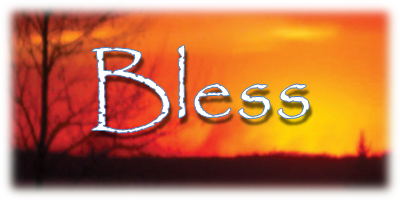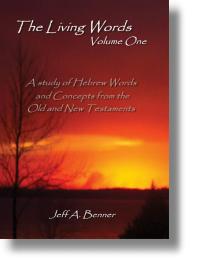Topics  The Living Words The Living Words 

The Living Words: Bless
This article is an xcerpt from Mr. Benner's book The Living Words.
Most Hebrew roots consist of three letters and can be written as a noun or a verb, but both are related in meaning. A good example is the root ברך which can be used as a noun, ברך berek [H:1290], meaning "knee" or as a verb, ברך barak [H:1288], meaning "to kneel." Both the noun and verb form can be seen in the following passage.
| ...and kneeled (barak) down upon his knees (berek) before all the congregation of Israel, and spread forth his hands toward heaven 2 Chronicles 6:13 (KJV) |
Additional nouns are developed out of the root by adding specific letters to the root, the most common being the addition of the letter ה to the end of the root, such as in the word ברכה berakah [H:1293] (The כ and ך are both the same letter "kaph." The form ך is used when it comes at the end of a word.). This word is a gift or present and is related to the root through the idea of bending down to the knee and presenting a gift to another. Each verb also has the ability to slightly change in meaning by changing the "form" of the verb. The "piel" form of the verb ברך barak [H:1288] literally means "to bend the knee to present a gift." These definitions are the original concrete meanings of these words, but you will recognize them more easily by the abstract words the translators usually use to translate them.
| And Esau said unto his father, Hast thou but one blessing (berakah), my father? bless (barak) me, even me also... Genesis 27:38 (KJV) |
A more literal translation of this verse would read as;
| And Esau said unto his father, Hast thou but one gift (berakah), my father? Kneel down and present me a gift (barak), even me also... |
While I prefer to use the concrete definitions of Hebrew words, I am not implying the Ancient Hebrews were void of any abstract thought. On the contrary, the Hebrew language is filled with abstract thought, but the difference between Hebrew and Greek abstracts is Hebrew abstracts are related to something concrete while Greek abstracts are not.
A "blessing" from Greek thought is a pure abstract with no foundation in the concrete, but from a Hebraic perspective a "blessing" is any action or object that is presented out of respect to another.
| Bring ye all the tithes into the storehouse, that there may be meat in mine house, and prove me now herewith, saith the LORD of hosts, if I will not open you the windows of heaven, and pour you out a blessing (berakah), that there shall not be room enough to receive it. Malachi 3:10 (KJV) |
Related Pages by Jeff A. Benner
 | | The Living Words (Book)
A study of Hebrew words in the Old and New Testament from their original Hebraic perspective. |
 | | The Living Words: Unity (Article)
Excerpt from Mr. Benner's Book "The Living Words" and examining the Hebrew word for unity. |
|






